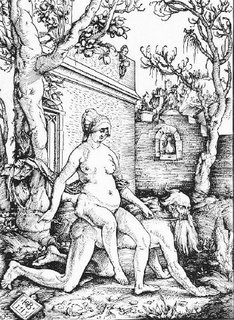Feminomenon
Once again, we ruthlessly interrogate a (small, helpless) narrative. The writing in question is that of our own robot, who, commenting on a post of some days ago, made "judicious use of the third person singular feminine(!) pronoun" (The Sheriff). While laboring on my thesis under the spell of Lacanian theorist Joan Copjec, who can be seen looking lovely at Zizek's wedding (top left), I was reminded of robot's comment:
The 21st citizen-intellectual must be her own think tank. Her traditional role as skeptic and scalpal-wielder (in the Nietzschian sense) persists, but at some point she must take a stand. She must involve herself in policy in addition to acheiving a critical distance. Each time she asks herself whether America has a soul; whether we are to be defined by multiculturalism or some universalism; whether we are subjects of a dominating culture industry--she must also ask how our immigration laws need to be reformed; whether we need taxs or not, and how should the tax cuts be structured.
As a poor example of male misogyny in action, I welcome robot's switch-up, the substitution of "her" for "his." I am interested, however, in the effect of this change upon the narrative. In my own reading, "her" stands out like a sore but inoffensive thumb - there's nothing wrong with her being there, but whatever it is that she's doing is difficult to ignore. Rather than offer an explanation of this phenomenon, I would ask for interpretations: what does gender difference, to the extent that we accept its existence, have to do with the affect of "him" versus "her," "he" against "she," in narrative? I would expect our responses to be as entertaining as they are intelligent, flawlessly theorized, and rigorously upper-crust.
 Also, because I have to deal with pictures as a function of my major, here is something spellbinding to look at.
Also, because I have to deal with pictures as a function of my major, here is something spellbinding to look at.
The 21st citizen-intellectual must be her own think tank. Her traditional role as skeptic and scalpal-wielder (in the Nietzschian sense) persists, but at some point she must take a stand. She must involve herself in policy in addition to acheiving a critical distance. Each time she asks herself whether America has a soul; whether we are to be defined by multiculturalism or some universalism; whether we are subjects of a dominating culture industry--she must also ask how our immigration laws need to be reformed; whether we need taxs or not, and how should the tax cuts be structured.
As a poor example of male misogyny in action, I welcome robot's switch-up, the substitution of "her" for "his." I am interested, however, in the effect of this change upon the narrative. In my own reading, "her" stands out like a sore but inoffensive thumb - there's nothing wrong with her being there, but whatever it is that she's doing is difficult to ignore. Rather than offer an explanation of this phenomenon, I would ask for interpretations: what does gender difference, to the extent that we accept its existence, have to do with the affect of "him" versus "her," "he" against "she," in narrative? I would expect our responses to be as entertaining as they are intelligent, flawlessly theorized, and rigorously upper-crust.
 Also, because I have to deal with pictures as a function of my major, here is something spellbinding to look at.
Also, because I have to deal with pictures as a function of my major, here is something spellbinding to look at.
3 Comments:
Being the Derridean I am, I would urge you to be skeptical about how others might have received what you term my mysoginism. They might have seen it for what it was: a monumental effort to tear down binaries, reeducate the masses, and serve up some rhetorical gusto in, otherwise, a moment of great uncertainty.
That being said, I think it would be interesting to share how my thesis advisor chooses to go about this business of gender. When she (is she really a woman or am I just being mysoginistic?) read through my last draft, she corrected every he/she/it to a back-and-forth of he and she. So, I could have a sentences that reads: "The child is innocent. He comes from nature and so is naturally good. She is corrupted by adults and their big bad cities."
I don't have a sentence like this with parrallel pronounal construction, but I think this is how many people would like to see it.
My thoughts? I think this just sounds really bad. I'm all in favor of gender consciousness while writing, but if it comes at the expense of beauty, I'm no longer onboard. With art, it's much the same. As your painting demonstrates, we could have gender equality, but then look at what we've lost: a nake chick sitting on old man whither's back.
! I hope you don't think I'm calling what you did misogynistic. Far from it. Interesting, yes. Worth thinking about, yes. Kill them bitches, no.
Aha. I understand.
Re: "As a poor example of male misogyny in action, I welcome robot's switch-up, the substitution of "her" for "his.""
This should by read as "Because I am a poor example of misogyny in action and therefore do not support misogynist programs or statements, I welcome robot's switch-up." I hope that clarifies things.
Post a Comment
<< Home